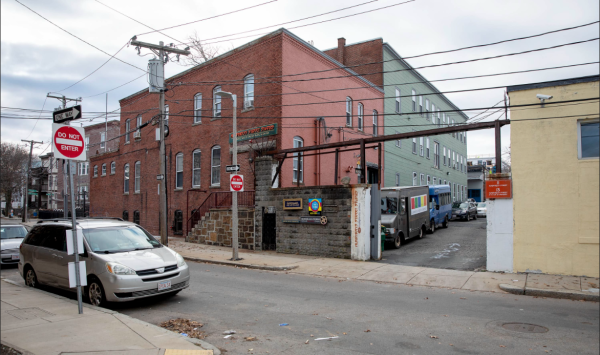November 23, 2022

The main entrance to the Humphreys Street Studios. Robin Lubbock/WBUR photo
Cristina Todesco, a theatrical set designer, wasn’t too concerned when she first found out her Dorchester studio was going up for sale. But with a big developer sniffing around, she began to feel uneasy. It was 2019, the Boston real estate market was hot, and it seemed a foregone conclusion that anyone who purchased the property at 11-13 Humphreys St. would either raise rents or raze the building.
“That got us really worried,” Todesco says. “And we also realized that the artists here, we could not buy the property ourselves.”
But that feeling changed as time passed and the property, which was valued at $3.1 million, remained on the market. The 40 or so artists who rented studios at Humphreys Street wondered: Could they find a way to purchase the building themselves?
More than two years and countless close calls later, that dream is a reality.
The artists, in partnership with the mission-driven developer New Atlantic Development, closed on the property in early November to the tune of $2.8 million. The acquisition was made possible with financing from nonprofit lenders BlueHub Capital and LISC, as well as $1.7 million from the city of Boston. The studios will be operated by a nonprofit, HSS Artist Collective Inc., with a majority of artist tenants on the board of directors. New Atlantic plans to build income-restricted housing on the property’s empty back lot.
The road to get there wasn’t easy. The Humphreys Street Studios were founded in 2001 by two local artists, Joe Wheelwright and Neal Widett, who cultivated a vibrant artist community by keeping rents low. Both men died in recent years, passing their ownership shares to their widows; they, and the two remaining partners, decided to put the building, a former dry-cleaning facility, up for sale.
The artists despaired in 2021 when the owners entered into a deal with another developer. That agreement ultimately fell through, but it would be another year before the artists and New Atlantic finally signed a purchase and sale agreement with the seller.
It helped that the property’s empty back lot could be developed into housing. “We had a very special set of circumstances, which makes it a hard model to repeat,” Todesco says. But she is hopeful that the relationships forged within City Hall, and with developers like New Atlantic, will help other artist communities that are at risk of displacement. “I think we’re sort of educating people to see that there are creative solutions around this.”
Boston’s chief of arts and culture, Kara Elliott-Ortega, sees it as a first for her office as well. “As long as I’ve been with the city, which is seven years, in a situation of crisis like that, we haven’t gotten to the solution of actually having the artists own the building,” she says.
The Office of Arts and Culture helped connect the artists with New Atlantic, and paid for a feasibility study on the property. It was ultimately able to help contribute $250,000 in ARPA funds toward the acquisition of the building — a drop in the bucket, but a significant one, according to Elliott-Ortega.
“It was enough to help bring on other investors [and] grow confidence that this is something that can happen,” she says. “It was enough to close the gap on that part of the acquisition. And,so I think it’s a great example, in the sense that the city’s money was really leveraged super efficiently to do this bigger project.”
Now, the hard work begins for the artists who rent space at Humphreys Street Studios. Todesco says tenants will be grandfathered in at the current rates, and the nonprofit will be tasked with figuring out a sliding-scale rental model for new tenants.
But the real lesson for Todesco lies in the success of the artists’ organizing effort. “It’s about advocating for artists in Boston,” she says. “And making sure that other folks, that the public, can see the value of artists in the environment, in the community.”
This article was first published by WBUR 90.9FM on Nov. 10. The Reporter and WBUR share content through a media partnership.


